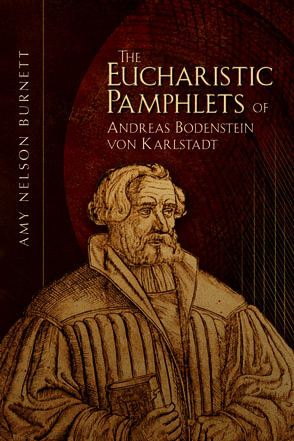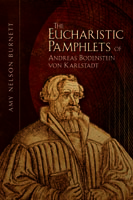
The Eucharistic Pamphlets of Andreas Bodenstein von Karlstadt
Translated and Edited by Amy Nelson Burnett
The Eucharistic Pamphlets of Andreas Bodenstein von Karlstadt
Translated and Edited by Amy Nelson Burnett
“Andreas Karlstadt, Luther’s senior colleague at Wittenberg, may well be the most misunderstood reformer of the sixteenth century—even though there are others, perhaps even Martin Luther, who vie for such dubious honor.
- Description
- Reviews
- Bio
- Table of Contents
Andreas Bodenstein von Karlstadt played a key role in the development of the evangelical understanding of the Lord's Supper. In 1521 he wrote several pamphlets urging a reform of the Mass. In 1524 he broke with Martin Luther and published a second group of pamphlets rejecting the traditional belief in Christ's corporeal presence in the Eucharist. Despite the importance of Karlstadt's tracts, they are little known today, and his understanding of the Lord's Supper is often reduced to a caricature. For the first time, Amy Nelson Burnett translates his thirteen pamphlets into English, illuminating Karlstadt's importance for the Reformation debate over the Eucharist and his contribution to what would become Reformed sacramental theology.“Andreas Karlstadt, Luther’s senior colleague at Wittenberg, may well be the most misunderstood reformer of the sixteenth century—even though there are others, perhaps even Martin Luther, who vie for such dubious honor.
Karlstadt’s cardinal sin was to have opposed Luther—and that at the critical initial stage of the Reformation, and Luther’s judgment has dominated the scholarly assessments of Karlstadt’s theology ever since. More recently, however, a more detached perspective has pointed out how Karlstadt was in many ways a trailblazer: he understood the theological and ecclesiastical implications of the new “Wittenberg Theology” better than most. And modified it. That certainly was the case with respect to the implications of Luther’s redefinition of the sacrament and his repudiation of the scholastic notion of transubstantiation.
Professor Nelson’s English translation of several Karlstadt tracts is therefore a superb and most welcome contribution. The translation is accurate, the scholarly apparatus appropriate, the bibliography helpful. The book will allow English speaking students of the Reformation to study firsthand the theological details of the early stage of the controversy in the reformers’ ranks over Communion from Karlstadt’s perspective, and thereby understand better the early dynamics of the broader movement of reform.”“No less an achievement in view of Karlstadt’s often obscure German is Burnett’s masterful translation of thirteen key Eucharistic pamphlets into English—thus enabling scholars and students to read them side-by-side with Luther’s and Zwingli’s contemporaneous writings on the same topic and thus come to a more complete understanding of this key inner-Protestant dispute.”“Burnett has also published a set of her own English translations of the eucharistic pamphlets of Andreas Bodenstein von Karlstadt, the early reformer in Wittenberg who fell out with Luther over the eucharist and whose critical role in the controversy and in the development of Reformed eucharistic theology has not, according to Burnett, been properly recognised.... [this volume allows scholars] the opportunity to follow through with their own analysis of many of the primary sources.”“Finally audiences in English can hear the other voice in the debates over the Eucharist.… Burnett’s facility with early modern German is impressive and the translations are both faithful to the original and very readable in English. She helpfully provides a full provenance for each pamphlet and even keeps track of the original publication folios in brackets…a welcome addition to our knowledge and understanding of Eucharistic theology in the Reformation era.”“[Burnett] provides documentation of the reformer's actual opinions, translating thirteen works by Karlstadt on the topic of the Eucharist and providing the translations with informative footnotes. Most are polemics—and only a few have appeared previously in English; but Burnett has wisely chosen to include a sermon delivered in 1522 to illustrate how the reformer's ideas were taken into the pulpit. The English versions are readable allowing for the reformer's relentless denunciations of contrary opinions. The translations are accompanied by a lucid introduction, providing contexts for the texts, as well as a chronology of evangelical writings on the topic.”Amy Nelson Burnett is professor of history at the University of Nebraska-Lincoln. She specializes in the Swiss/South German Reformation and is the author of The Yoke of Christ: Martin Bucer and Christian Discipline (1994) and Teaching the Reformation: Minister and their Message in Basel, 1529–1629 (2006), which won the Gerald Strauss Prize.
Amy Nelson Burnett is professor of history at the University of Nebraska-Lincoln. She specializes in the Swiss/South German Reformation and is the author of The Yoke of Christ: Martin Bucer and Christian Discipline (1994) and Teaching the Reformation: Minister and their Message in Basel, 1529–1629 (2006), which won the Gerald Strauss Prize.
Maps and Illustrations
Chronology
Introduction
On the Recipients, Signs, and Promise of the Holy Sacrament (June 1521)
On the Adoration and Veneration of the Signs of the New Testament (November 1521)
On Both Forms in the Holy Mass (November 1521)
Sermon of Andreas Bodenstein von Karlstadt Given in Wittenberg on the Reception of the Holy Sacrament (January 1522)
On the Priesthood and Sacrifice of Christ (December 1523/January 1524)
Against the Old and New Papistic Masses (October 1524)
Whether One Can Prove from Holy Scripture That Christ Is in the Sacrament with Body, Blood, and Soul (October 1524)
Exegesis of This Word of Christ: “This Is My Body, Which Is Given for You. This Is My Blood, Which Is Shed for You,” Luke 22 (October 1524)
Dialogue, or a Discussion Booklet on the Horrible and Idolatrous Misuse of the Most Worthy Sacrament of Jesus Christ, 1524 (October 1524)
On the Anti-Christian Abuse of the Lord’s Bread and Cup (October 1524)
Explanation of 1 Corinthians 10: “The Bread That We Break, Is It Not a Fellowship of the Body of Christ?” Answer of Andreas Karlstadt to Luther’s Book, and How Karlstadt Recants (March 1525)
On the New and Old Testament. Answer to the Saying, “The cup, the new testament in my blood,” etc., Luke 22; 1 Cor. 11. How Karlstadt Recants. 1525 (April 1525)
A Declaration of How Karlstadt Regards His Teaching about the Venerable Sacrament et cetera and Wants It to Be Regarded (September 1525)
Bibliography
About the Author
Index
Mailing List
Subscribe to our mailing list and be notified about new titles, journals and catalogs.



